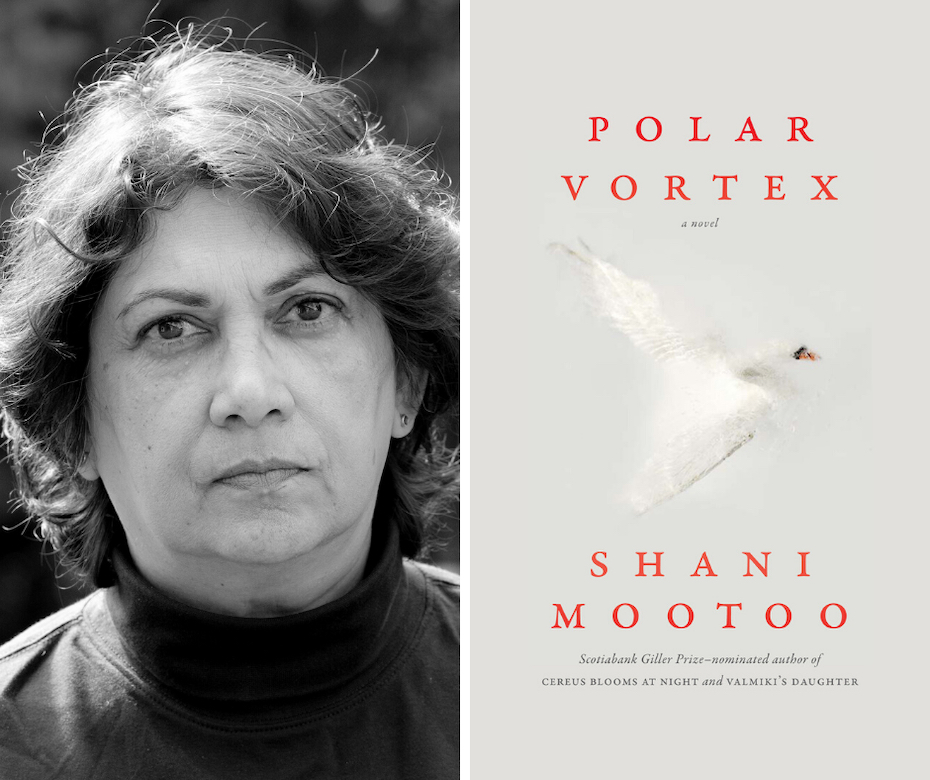In Conversation: Shani Mootoo

“Trepidation sometimes, courage at others, and a nagging curiosity mostly.” —Shani Mootoo
On Thursday, April 23rd, Shani Mootoo—award-winning author, painter, and photographer—launched Polar Vortex, her latest novel, on Instagram Live. What the event lacked in proximity, Shani made up for with warmth: the launch felt like a chat with a brilliant friend. Her interview with Book*hug was no different.
How has the pandemic affected your writing?
There are many aspects to this pandemic that have set my mind reeling with ideas. I’ve been able to write, but only in the first-person nonfiction genre, and in poetry. At a time when points cannot be too finely put, and metaphor and analogies risk being entertainment, writing fiction seems redundant and like a luxury.
How has it affected your reading?
Although I do read traditional books, I find myself reading off the internet more than usual. I want to know the most current news—not only of the virus situation here and around the world, but how people, artists and writers, and other kinds of thinkers are re-evaluating the meaning of life. I’m also watching live-streaming events, short videos (on photography, bread-making, art, etc.,) and listening to podcasts.
What are you currently writing?
Some nonfiction and poetry. Poetry is a kind of nonfiction, through which awe—fear and wonder—can, oddly, be grounded and grounding.
What are you currently reading?
Giovanni Boccaccio’s The Decameron, written in the 14th century at the time of the bubonic plague, a.k.a. the Black Death. And Anne Carson’s Nox, slowly, in order to savour each page—words and images of incredibly succinct sentiment.
What do you miss?
Going to Lily’s Café or the Beacon Bike + Brew for a chat with a friend, or reading over a cappuccino and a bowl of something.
Who do you miss?
I have several groups of friends, and I miss them all, the groups and the individuals. Okay, some more than others.
Where do you write?
I have a studio, and a desk, but I prefer to write at the counter in the kitchen, in the midst of the commotion of the parrots who always want attention.
What does and doesn’t help you write?
Peace-of-mind creates the space for me to write. But the lack of that peace, a restless mind, also sends me to writing. There’s another kind of peace-of-mind that can also set me to seeing arrogance and vanity in art-making of any kind, when putting a mark down seems to be about the fear of death, of denying it, and therefore refusing life itself. One of these is a trick, and I’m not always sure which is.
What do you write with?
Trepidation sometimes, courage at others, and a nagging curiosity mostly.
What makes you happy?
The parrots using a mix of their language and English words and sentences to get my attention. I am easily flattered.
How did you know that your most recently written book was finished?
I knew when upon reading the manuscript for the umpteenth time, I felt that no questions came up for me.
Do you have a preference for fiction, nonfiction, or poetry in your reading or writing?
I am more drawn to nonfiction and poetry as a reader. As for writing, I am happiest when I am lost in poetry.
Describe your favourite article of clothing.
I’m wearing it right now. A heavy crazily soft, cotton-on-the-outside, fleece-on-the-inside shirt-jacket. Miraculously, after numerous washings, neither cotton nor fleece has piled. It’s plaid, in shades of reds and blacks. I have one in shades of greens and blacks, too. I usually wear one of these shirt-jackets—like a light blanket—over one of the many t-shirts in my collection. Although it’s quite a handsome jacket, I only ever wear it inside the house. Never outside in public.
Describe the sky where you are.
In order to respond, I need to know first if this is an audition.
Tell us a very short story, or write a very short poem.
My mother was an Anglican. My father was a priest. When the rains came, they prayed real hard together, and reaped the smoothest stones you’ve ever seen. (Poetry or short story? Who knows.)
Tell us your favourite word, and why it’s your favourite.
Some gestures speak louder than words, and mine seems to be to hold my jaw in one hand and shake my head. While nuances are achieved by the accompanying actions of my eyes, I like the possibility of non-commitment while still seeming thoughtful, understanding and wise.
Shani Mootoo was born in Ireland, grew up in Trinidad, and lives in Canada. She holds an MA in English from the University of Guelph, writes fiction and poetry, and is a visual artist whose work has been exhibited locally and internationally. Mootoo’s critically acclaimed novels include Moving Forward Sideways Like a Crab, Valmiki’s Daughter, He Drown She in the Sea, and Cereus Blooms at Night. She is a recipient of the K.M. Hunter Artist Award, a Chalmers Arts Fellowship, and the Dr. James Duggins Outstanding Mid-Career Novelist Prize from the Lambda Literary Awards. Her work has been long- and shortlisted for the Scotiabank Giller Prize, the International DUBLIN Literary Award, and the Booker Prize. She lives in Prince Edward County, Ontario.

